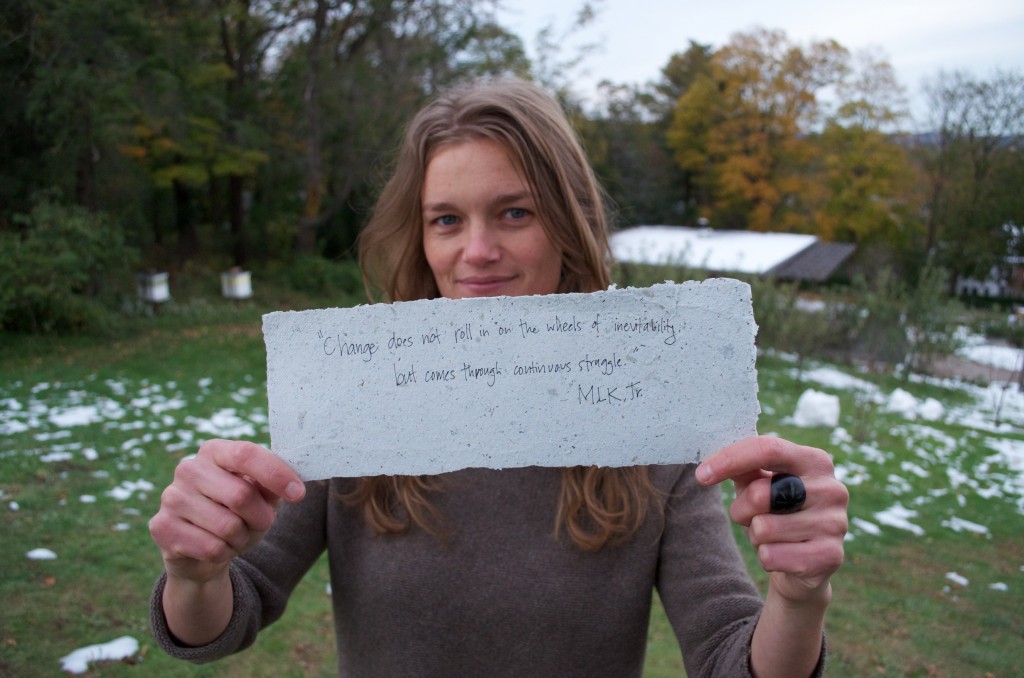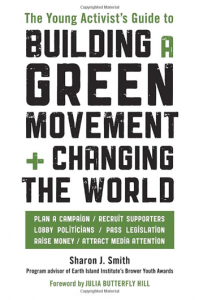Sharon Smith has hung banners targeting corporate headquarters and infiltrated industry gatherings. She fought battles to prevent logging-road construction in untouched US forests. And she ran a youth leadership award program – the Brower Youth Awards – that brought attention to the accomplishments of audacious young folks. She is also, incidentally, a masters student at the Yale School of Forestry & Environmental Studies. I recently caught up with Sharon over a pint at Archie Moore’s to talk about her new book, The Young Activist’s Guide to Building a Green Movement and Changing the World, and the process of training new leaders, tackling graduate school, and managing to stay sane.

SM: Sharon, tell me a little bit about your book.
I wrote the book to be an environmental organizing guide for teens and students. The “environment” started to get hot a few years ago and the market was flooded with books arguing for “personal lifestyle” choices – ride to school, switch your lightbulbs – as a way to respond to huge environmental problems. But young people can wield way more political power and have institutional impact if they band together and actually advocate for changes.
That is what this book is about. It’s “Organizing 101” – how to run for office, fund raise, influence officials. I tried to show young people that they didn’t need to be experienced or be a magician to impact the world. And I profiled other young people who saw things that they wanted to change in their communities and organized among themselves to bring about those changes.
Were did you get the experience needed to write such a book?
Lot’s of what I wrote about came from my experiences at Green Corps. And I’d been working for 10 years as an organizer. But thankfully a lot of it is not rocket science. It’s about putting your feet to the pavement. Honestly, nothing in this book is completely new – it’s old ideas and techniques packaged for a new audience. We’ve been using these tools since the 1960’s to achieve progress.
Do you consider yourself a writer?
Haha, no.
Why not? You wrote a book.
I think some writers write because they feel compelled to write or to get a certain message or idea out into the world. Some write because they love the craft of writing – it’s an art and they are good at it. I became a writer because a door opened to me. An agent called me after a Brower Youth Awards show – whose winners are featured in the book, incidentally – and she said that there was a book there. I agreed but I wondered how it would ever happen because, no, I’m not a writer.
We envisioned a different kind of book initially, more along the lines of “Notes from Canada’s Youth Activists,” something profiling front-line youth advocates. All publishers rejected this idea. Some said there was no market and others said that the market was saturated!
It turns out that we had offered 90% profiles of activists and 10% “how to,” and they wanted 90% “how to” and 10% profiles. And they wanted me to write it. I don’t see myself as a writer but I decided to say yes, in the end, because I thought that the book should be written. And, frankly, I said yes because it scared me. It was a challenge.
Did you think you couldn’t do it?
Well, [she laughs] you know you have to once you’ve taken an advance! I got an advance of 10k to write that book. Or my organization did.
How long did it take you to write?
Four and a half months. Three weeks starting to write, straight – putting the first words down – and then three months of writing on the weekends.
It was a funny context – I wrote it while I was in Ecuador and I did all my writing at Mister Bagel in Quito. I’ve tried every bagel flavor on the menu! I wrote on the weekends because my brain was fried from speaking Spanish during the week and writing was impossible. So I worked eight hours every weekend day, three hours research, five hours writing.
Yes nothing is better than a fixed deadline to get you working.
So what was your favorite bagel flavor?
Garlic Bagels, obviously.
Will you write another book?
It’s not in my plans…
So what’s in your plans?
Oh man don’t ask me that! I don’t know!
Sometimes I think about going back to activism. It is what fuels me – it’s my people and what I know. Sometimes I think about more traditional land conservation. I recently saw an OTS [Organization for Tropical Studies] position to go work in the rainforests. I thought, mmm, how dreamy to work in the tropics.
I feel like a lot of us have gone through some sort of existential soul-searching moment here at the Forestry School, I won’t call it a crisis – have you ever experienced that or have your goals remained set and your sites always focused?
Yes absolutely. But I’m not still in it. I came in with the intention of shifting my focus to tropical forest conservation. But I didn’t have it in me here to draft a proposal and design a research project and go out in the field for a second summer. I couldn’t do that with this book needing to come out. So I felt lost for a while. But I’m not that concerned now. Things worked out. I’m in a place where I’m not that worried about it.
Why do you think you aren’t worried about it?
Honestly, I just feel like things work out for me in life. I feel really blessed in many ways and I feel lucky. Opportunities that come before me, like writing this book, I didn’t pursue but we presented to me by someone else. Serendipity and our networks play an enormous role in shaping where we are going to be in the future. I don’t see a ton of point in worrying about it.
If you don’t know what your dream job is (your north star) – then it doesn’t help you to try to force it. You can get there, if you have a clear goal, but if not then I think it is best to do good work and see what comes your way.
What do you think are the biggest challenges facing environmentalists today?
I’m reading Derrick Jensen right now and he is a deep pessimist and he is critical of Bright Green environmentalism (using technology to improve things). The “technology is going to save us” kind of thing. That has never been true before.
Historically cities have always gotten their resources form the countryside – historically through force and destruction. The concept that cities can be sustainable through and through seems sort of absurd. I think maybe we are fooling ourselves. Sometimes I think that our world can keep going and we can keep raising the standard of living on this planet for everyone and do it in a sustainable manner. How is that possible? I’m an optimist but I don’t think my optimism is always buffered by historical precedent, or even realism.
What buffers it then?
Hope?
—
Sharon Smith is completing her Master of Environmental Management at the Yale School of Forestry and Environmental Studies. She is interested forest conservation on a landscape level and markets campaigns to shift corporate practices. Sharon is the author of the new book The Young Activist’s Guide to Building a Green Movement and Changing the World and is passionate about nurturing leadership at the heart of movements for social justice and environmental sustainability.
